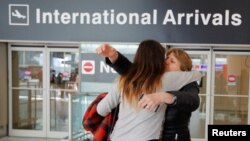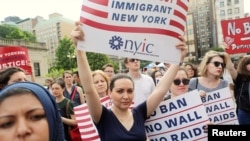Travelers to the United States from eight countries face new restrictions under a document that President Donald Trump signed on Sunday.
The new restrictions are to take effect on October 18. They will affect citizens from Iran, Libya, Somalia, Syria, Yemen, Chad, North Korea and Venezuela.
The Trump administration described the new measures in a statement on Sunday. It said these countries have refused to share information about terrorism and other issues with the United States.
The new measures do not apply to Sudan. Iraq also does not face entry restrictions, although travelers may face greater “screening security.” Those two countries had been included in earlier versions of Trump’s travel bans.
Countries added to travel restrictions list
Chad, North Korea and Venezuela are new additions to the travel ban.
The presidential proclamation states that, “North Korea does not cooperate with the United States government in any respect and fails to satisfy all information-sharing requirements.”
Venezuela was included for failing to cooperate in showing if travelers present “national security or public-safety threats.” U.S. officials also said Venezuela does not willingly receive Venezuelans deported from the U.S.
The Trump administration called Chad a “valuable and important” partner in fighting terrorism. But it noted that the country had not shared terrorism-related and other public safety information.
The statement says the restrictions are conditional and that the countries can take actions to ease the measures.
Human rights groups react
Human rights groups largely disapproved of the new ban.
The Council on American-Islamic Relations (CAIR) is a Muslim civil rights group based in Washington D.C. In a statement, the group denounced the policy, saying it was, in the group’s words, part of the administration’s “ugly white supremacist agenda.”
The London-based rights group Amnesty International also criticized the new restrictions. It said families had been torn apart since the last travel ban. It also said the ban unfairly targeted “whole nations of people” because of “the crimes of a few.” The group said the action did not keep anyone safe.
In the proclamation, the president said: “The restrictions announced are tough and tailored, and they send a message to foreign governments that they must work with us to enhance security.”
Trump released an executive order in March that placed travel restrictions on six Muslim-majority countries.
However, that order was immediately disputed and suspended in U.S. courts. Critics said the ban unfairly targeted Muslims.
In June, the U.S. Supreme Court permitted parts of the order to go into effect.
The earlier order placed entry restrictions on citizens of Iran, Libya, Somalia, Sudan, Syria and Yemen. Citizens of those countries were required to have a “credible claim of a bona fide relationship with a person or entity in the United States.”
Two of the three new countries placed on the travel ban list -- North Korea and Venezuela -- are not Muslim-majority. Chad is estimated to be majority Muslim. However, it has large populations of other religious groups, as well.
I’m Mario Ritter
Smita Nordwall reported this story for VOA News. Mario Ritter adapted it for VOA Learning English with additional materials. Ashley Thompson was the editor.
________________________________________________________________
Words in This Story
screening –n. the act of examining people to see if they can do something
proclamation –n. a statement by a public official calling for some action
deport –v. to cause a person who is not a citizen to leave a country
conditional –adj. describes something that will happen only if something else happens
tailor –v. to make something fit a certain situation, person, group or country
enhance –v. to improve or increase
bona fide –adj. in good faith
entity –n. something that exists separately, such as a business, organization, government or political groups
We want to hear from you. Write to us in the Comments section, and visit our Facebook page.






